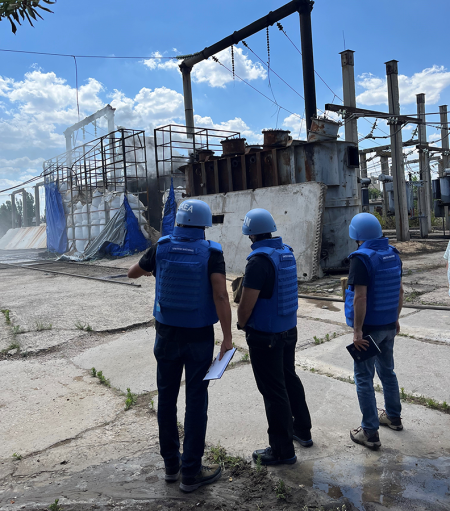"[Arms Control Today] has become indispensable! I think it is the combination of the critical period we are in and the quality of the product. I found myself reading the May issue from cover to cover."
IAEA Warns About Drones Near Zaporizhzhia
July/August 2024
By Kelsey Davenport
The head of the International Atomic Energy Agency (IAEA) said it is unacceptable for any party to use drones in the vicinity of the Zaporizhzhia Nuclear Power Plant after two drones struck targets in the nearby town of Enerhodar.

Russia attacked the Ukrainian power plant in violation of international law in the early days of its full-scale invasion of Ukraine and continues to occupy the facility.
Russia accused Ukraine of conducting drone strikes on June 19 and 21 that cut power to residents of Enerhodar, a town near the Zaporizhzhia plant where many workers at the facility live.
IAEA Director-General Rafael Mariano Grossi said on June 23 that “drone usage against the plant and its vicinity is becoming increasingly more frequent” and “must stop.” The drone activity “runs counter to the safety pillars and concrete principles, which have been accepted unanimously,” Grossi said.
The June drone strikes targeted electrical substations, but did not disrupt the plant’s power lines, which are critical for maintaining the nuclear reactor units in a cold shutdown. The damage to the electrical substations affected systems around the power plant, such as external radiological monitoring equipment, the IAEA said in a June 23 press release.
In May the IAEA team on-site at the complex was told that there were drones present in the vicinity of the cooling pond, where spent fuel from the six reactors at Zaporizhzhia is stored, but there was no attack reported. In April, drones struck a reactor building. (See ACT, May 2024.) Russia and Ukraine accused each other of being responsible for the April attacks.
Despite the security situation, Russia initially said it would restart the Zaporizhzhia reactors, which are currently in cold shutdown. During a meeting with Grossi in May, officials from the Russian state-run energy company Rosatom said that was no longer the plan, according to Russian media reports.
